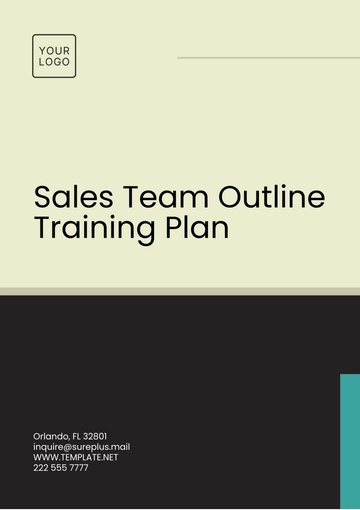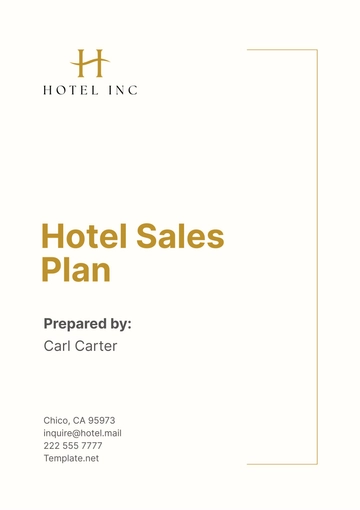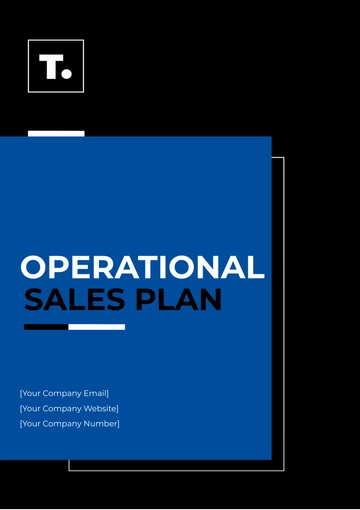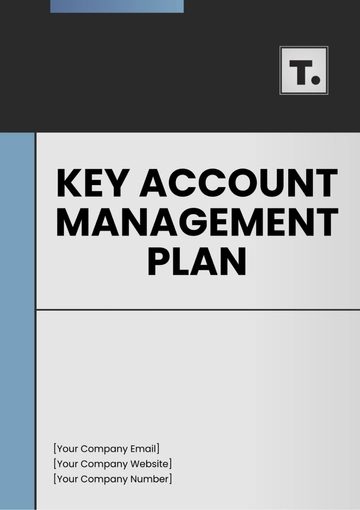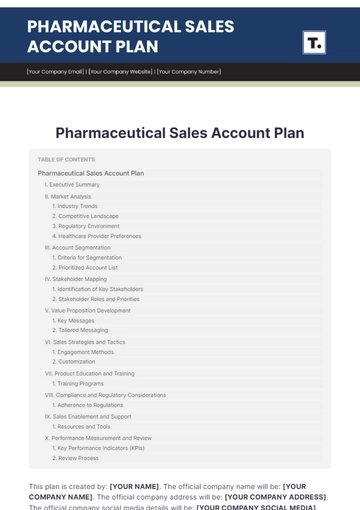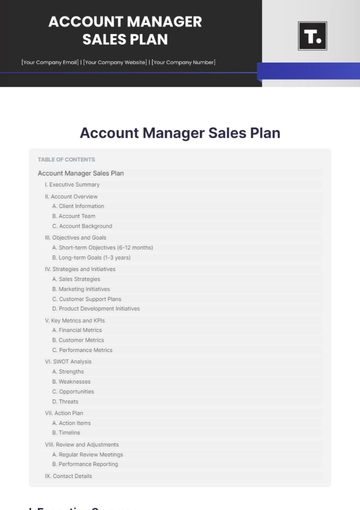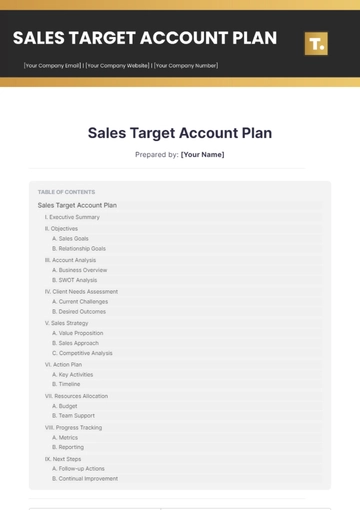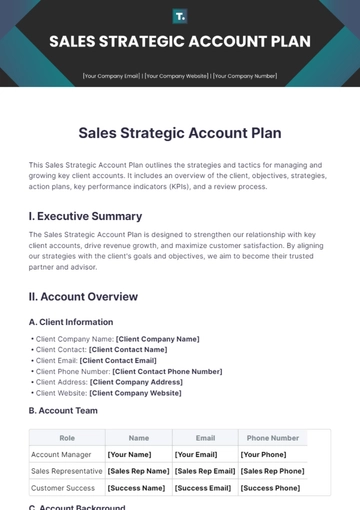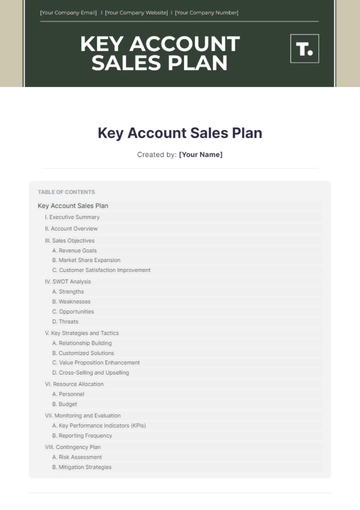Free Aesthetic Sales Training Plan

Prepared by | Company | Date |
|---|---|---|
[Your Name] | [Your Company Name] | [Date] |
I. Introduction
As the Branch Manager of [Your Company Name], we must ensure our sales team is equipped with the necessary skills and knowledge to excel in their roles. This Sales Training Plan aims to enhance the performance of our sales professionals through targeted training initiatives.
II. Objectives
Onboarding new sales hires effectively to reduce ramp-up time and ensure early productivity. This will enable us to maintain consistency in our sales approach and quickly integrate new team members into our culture.
Improve sales techniques and tactics to increase conversion rates and average deal sizes. By refining our sales processes and equipping our team with advanced selling skills, we can drive higher revenue and profitability.
Introduce and promote new products/services efficiently to capitalize on market opportunities. It's essential that our team stays abreast of our latest offerings and can effectively communicate their value to prospects.
Address specific challenges identified within the sales team to overcome obstacles and improve overall performance. By providing tailored support and training, we can help our team members overcome any hurdles they may face.
Foster a culture of continuous learning and improvement to stay ahead of competitors and meet evolving customer needs. Encouraging ongoing professional development will ensure our team remains agile and adaptable in a rapidly changing marketplace.
III. Training Components
A. Onboarding New Sales Hires
Introduction to [Your Company Name]'s mission, values, and customer-centric approach. New hires must understand the core principles that guide our sales efforts.
Overview of our comprehensive product portfolio and target market segments. New team members must have a deep understanding of what we offer and who we serve.
Training on sales processes, including lead generation, qualification, and pipeline management, utilizing our CRM system. Providing hands-on experience with our sales tools will accelerate their learning curve.
B. Enhancing Sales Techniques
Workshops on effective communication, including active listening and impactful questioning techniques. Strong communication skills are essential for building rapport and understanding customer needs.
Role-playing exercises for objection handling and negotiation in various scenarios. By practicing real-world scenarios, our team can develop confidence and proficiency in handling objections.
Advanced training in closing strategies, upselling, and cross-selling techniques. Equipping our team with advanced selling techniques will enable them to maximize opportunities and drive revenue.
C. Introducing New Products/Services
Detailed product/service training sessions, highlighting key features, benefits, and competitive advantages. Our team must be well-versed in the value proposition of our offerings to effectively sell them.
Development of a sales playbook for each new offering, including target customer profiles and sales messaging. Providing structured guidance will empower our team to effectively position new products/services in the market.
Practice scenarios to demonstrate product knowledge and effectively articulate value propositions to prospects. Hands-on practice will ensure our team can confidently address customer inquiries and objections.
D. Addressing Specific Challenges
Individualized coaching sessions based on performance evaluations and skill gap analyses. Tailoring support to each team member's needs will maximize the effectiveness of our training efforts.
Targeted training modules focused on areas such as time management, objection handling, or territory management. Addressing specific areas of improvement will help our team members overcome obstacles and reach their full potential.
Peer learning opportunities through team meetings or mentorship programs to share best practices and solutions. Encouraging collaboration will foster a supportive environment where team members can learn from one another.
E. Continuous Improvement
Regular sales meetings to discuss successes, challenges, and market trends, fostering a collaborative learning environment. Open dialogue will facilitate knowledge sharing and alignment across the team.
Access to online resources such as industry articles, webinars, and sales training courses to support ongoing skill development. Providing resources for self-directed learning will empower our team to take ownership of their professional growth.
Encouragement of professional development through certifications and participation in relevant industry events. Investing in our team's development will not only benefit them individually but also strengthen our overall sales capabilities.
IV. Training Schedule
Week | Activities |
|---|---|
Week 1: Onboarding |
|
Week 2: Sales Techniques |
|
Week 3: New Products/Services |
|
Week 4: Addressing Challenges |
|
Ongoing: Continuous Improvement |
|
V. Implementation
Assign responsibility for each training component to relevant team members or departments, ensuring accountability and ownership. Clear roles and expectations will facilitate the smooth execution of the training plan.
Establish a timeline for training sessions and activities, taking into account the availability of resources and scheduling constraints. Setting deadlines will help us stay on track and ensure timely completion of training initiatives.
Provide necessary resources, including training materials, access to technology platforms, and budget allocations for external training programs. Equipping our team with the tools they need is essential for their success.
Monitor progress through regular check-ins and feedback loops, adjusting the plan as needed based on participant engagement and performance metrics. Continuous evaluation will enable us to course-correct and optimize our training efforts as we go.
VI. Evaluation
Conduct regular assessments, such as quizzes, role-plays, or surveys, to measure the effectiveness of the training plan and gather participant feedback. Assessing learning outcomes will help us gauge the impact of our training initiatives.
Gather qualitative feedback from sales team members on the relevance and impact of training activities, identifying strengths and areas for improvement. Soliciting input from our team will ensure that our training plan meets their needs and expectations.
Analyze sales performance data, including metrics like win rates, sales cycle length, and customer satisfaction scores, to identify correlations with training initiatives and inform future training needs. Connecting training outcomes to business results will demonstrate the ROI of our training efforts.
VII. Conclusion
By implementing this Sales Training Plan, we aim to empower our sales team at [Your Company Name] to achieve greater success and contribute to the growth of our organization. Continuous investment in training and development is key to maintaining a competitive edge in the market and delivering exceptional value to our customers. Together, we will elevate our sales performance and drive sustainable business growth.
- 100% Customizable, free editor
- Access 1 Million+ Templates, photo’s & graphics
- Download or share as a template
- Click and replace photos, graphics, text, backgrounds
- Resize, crop, AI write & more
- Access advanced editor
Enhance, Discover, and Boost your team's performance with the Sales Training Plan Template from Template.net. This customizable and editable tool ensures tailored strategies for success. Effortlessly modify it to fit your needs using our Ai Editor Tool. Maximize efficiency and achieve your sales goals with precision and ease. Ensure your sales team’s success with a personalized training plan today.
You may also like
- Finance Plan
- Construction Plan
- Sales Plan
- Development Plan
- Career Plan
- Budget Plan
- HR Plan
- Education Plan
- Transition Plan
- Work Plan
- Training Plan
- Communication Plan
- Operation Plan
- Health And Safety Plan
- Strategy Plan
- Professional Development Plan
- Advertising Plan
- Risk Management Plan
- Restaurant Plan
- School Plan
- Nursing Home Patient Care Plan
- Nursing Care Plan
- Plan Event
- Startup Plan
- Social Media Plan
- Staffing Plan
- Annual Plan
- Content Plan
- Payment Plan
- Implementation Plan
- Hotel Plan
- Workout Plan
- Accounting Plan
- Campaign Plan
- Essay Plan
- 30 60 90 Day Plan
- Research Plan
- Recruitment Plan
- 90 Day Plan
- Quarterly Plan
- Emergency Plan
- 5 Year Plan
- Gym Plan
- Personal Plan
- IT and Software Plan
- Treatment Plan
- Real Estate Plan
- Law Firm Plan
- Healthcare Plan
- Improvement Plan
- Media Plan
- 5 Year Business Plan
- Learning Plan
- Marketing Campaign Plan
- Travel Agency Plan
- Cleaning Services Plan
- Interior Design Plan
- Performance Plan
- PR Plan
- Birth Plan
- Life Plan
- SEO Plan
- Disaster Recovery Plan
- Continuity Plan
- Launch Plan
- Legal Plan
- Behavior Plan
- Performance Improvement Plan
- Salon Plan
- Security Plan
- Security Management Plan
- Employee Development Plan
- Quality Plan
- Service Improvement Plan
- Growth Plan
- Incident Response Plan
- Basketball Plan
- Emergency Action Plan
- Product Launch Plan
- Spa Plan
- Employee Training Plan
- Data Analysis Plan
- Employee Action Plan
- Territory Plan
- Audit Plan
- Classroom Plan
- Activity Plan
- Parenting Plan
- Care Plan
- Project Execution Plan
- Exercise Plan
- Internship Plan
- Software Development Plan
- Continuous Improvement Plan
- Leave Plan
- 90 Day Sales Plan
- Advertising Agency Plan
- Employee Transition Plan
- Smart Action Plan
- Workplace Safety Plan
- Behavior Change Plan
- Contingency Plan
- Continuity of Operations Plan
- Health Plan
- Quality Control Plan
- Self Plan
- Sports Development Plan
- Change Management Plan
- Ecommerce Plan
- Personal Financial Plan
- Process Improvement Plan
- 30-60-90 Day Sales Plan
- Crisis Management Plan
- Engagement Plan
- Execution Plan
- Pandemic Plan
- Quality Assurance Plan
- Service Continuity Plan
- Agile Project Plan
- Fundraising Plan
- Job Transition Plan
- Asset Maintenance Plan
- Maintenance Plan
- Software Test Plan
- Staff Training and Development Plan
- 3 Year Plan
- Brand Activation Plan
- Release Plan
- Resource Plan
- Risk Mitigation Plan
- Teacher Plan
- 30 60 90 Day Plan for New Manager
- Food Safety Plan
- Food Truck Plan
- Hiring Plan
- Quality Management Plan
- Wellness Plan
- Behavior Intervention Plan
- Bonus Plan
- Investment Plan
- Maternity Leave Plan
- Pandemic Response Plan
- Succession Planning
- Coaching Plan
- Configuration Management Plan
- Remote Work Plan
- Self Care Plan
- Teaching Plan
- 100-Day Plan
- HACCP Plan
- Student Plan
- Sustainability Plan
- 30 60 90 Day Plan for Interview
- Access Plan
- Site Specific Safety Plan



